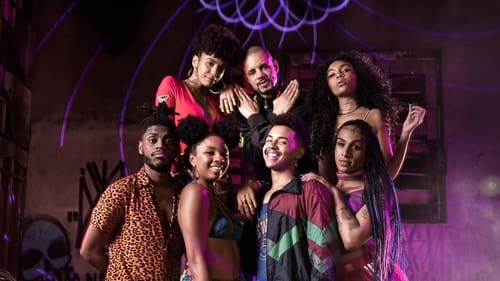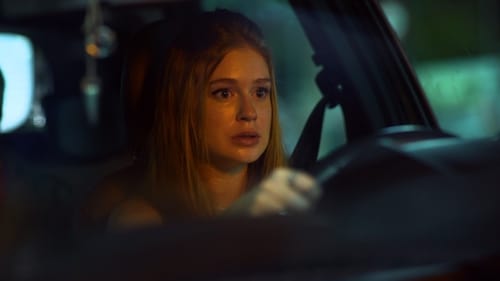Linn da Quebrada
출생 : 1990-07-18, São Paulo, São Paulo, Brazil
약력
Cultural agitator, singer, actress, and screenwriter. Linn was born in São Paulo, Brazil and is currently 31 years old. As a singer, Linn's biggest hits include "Oração", "Tomara", "Bixa Preta", "Alavancô", and "Necomancia". As an actress, Linn had a significant role in the drama series Segunda Chamada and will appear in the upcoming romantic comedy Vale Night.

Inspired by a real woman, who filmed for two years, hidden, the routine of drug dealers on Ladeira dos Tabajaras, in Copacabana, in 2004. At the time, the material was passed on to the police, who opened an investigation and carried out an operation that resulted in in the arrest of more than 30 people, including military police involved with the gang.

DJ Pulga
Tired of the responsibilities of her first child, Daiana decides to take a "Vale Night" to spend the night with her friends, but for that she needs to leave the child with the child's father. Vini, also bored, decides to take the baby to the funk party, where everything goes well until he loses the boy and goes in search of the child throughout the community, putting himself in unusual and fun situations so that Diana doesn't notice anything.

Music
Daniela is about to have her long-awaited gender reassignment surgery, and she can't think about anything else. Roberto, her lover, tries to dissuade her from doing it, revealing an unsettling relationship that awakes past traumas.

Writer
A portrait of transgender musician and artist Linn da Quebrada, who uses her body and performances as weapons to fight sexism, homophobia, and racism.

Music
A portrait of transgender musician and artist Linn da Quebrada, who uses her body and performances as weapons to fight sexism, homophobia, and racism.

Herself
A portrait of transgender musician and artist Linn da Quebrada, who uses her body and performances as weapons to fight sexism, homophobia, and racism.

Marilda
Sao Paulo, Brazil. Isabel, a 25-year-old girl, is kidnapped. The first ATM the criminals try to withdraw money from is broken. It's almost 10:00pm. The kidnappers realize they will not be able to get to the next one on time. What was meant to be an express kidnapping becomes an all-night imprisonment.

Abrindo o Armário dives into the process of liberation and conquests of the gay movement in Brazil. Through interviews, archival images and artistic performances, the film shows how homosexuals from different generations faced resistance, conquered spaces and fought for the right to construct a political, social and collective identity.

Who are the chicks that make up the funk movement, and where are they? Funk has always been a form of protest, just as being a woman is. BEAT IS PROTEST: FUNK FROM A FEMALE PERSPECTIVE depicts the last decade underground scene of the funk women protesters in São Paulo. The testimonies come from transgender and cisgender women who navigate this universe in different roles, such as singers, DJs, beat-makers, producers, entrepreneurs, rappers, and dancers, and also from drag queens.

Self
상파울루 빈곤 지역. 여기 네 명의 트랜스젠더가 있다. 이들은 각자의 자리에서 일상을 지킨다. 아이들을 가르치고 직장에 가거나 학교에 간다. 각자의 방식대로 나를 잃지 않으려 한다. 나의 존재는 연극과 노래로, 때로는 사진이나 말로 세상에 드러난다. 서로 다른 삶에서 나는 오늘도 나의 몸, 나의 정체성 그리고 내가 불리고자 하는 이름으로 살고 싶다. 일상이 곧 저항이 되는 내 몸은 정치적이다.
(2018년 제23회 서울인권영화제)

Simplesmente Pantera
Elias is a handsome young deputy manager in a garment factory in São Paulo. When he’s not working, he enjoys casual encounters in the big city. The arrival of a young African, Fernando, on the production line piques his interest and Elias finds himself increasingly drawn into socialising with his work colleagues.

Writer
An audiovisual experiment showing female power in its various possibilities. It evolves through three narrative moments: the prologue, the central narrative, and the epilogue. The first materializes and at the same time rebels against the cultural construction of the "cult of the Phallus". In the second moment, we can see the formation of a network of protection and mutual help among women, exalting their bodies and their powers. And the last moment is practically a making off, with real scenes of all the women in the cast recording the video.

Director
An audiovisual experiment showing female power in its various possibilities. It evolves through three narrative moments: the prologue, the central narrative, and the epilogue. The first materializes and at the same time rebels against the cultural construction of the "cult of the Phallus". In the second moment, we can see the formation of a network of protection and mutual help among women, exalting their bodies and their powers. And the last moment is practically a making off, with real scenes of all the women in the cast recording the video.

An audiovisual experiment showing female power in its various possibilities. It evolves through three narrative moments: the prologue, the central narrative, and the epilogue. The first materializes and at the same time rebels against the cultural construction of the "cult of the Phallus". In the second moment, we can see the formation of a network of protection and mutual help among women, exalting their bodies and their powers. And the last moment is practically a making off, with real scenes of all the women in the cast recording the video.













